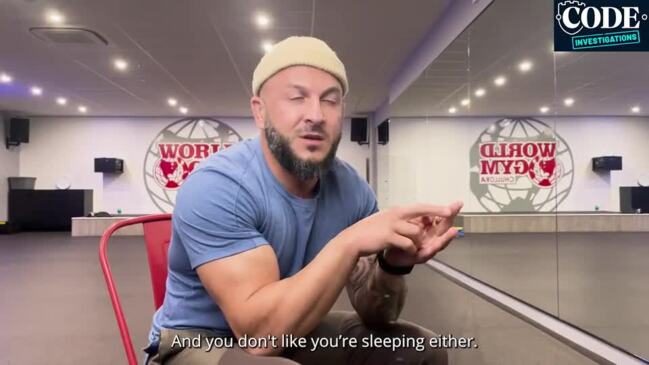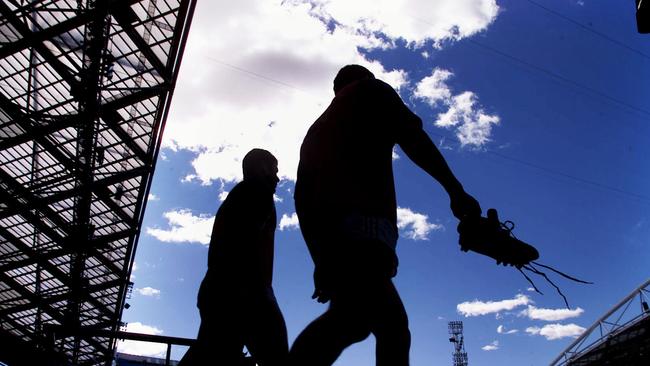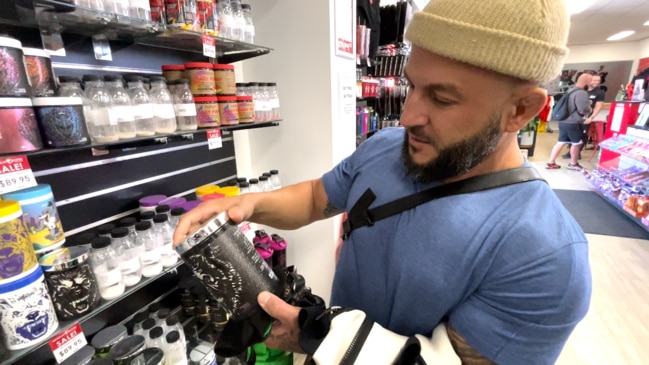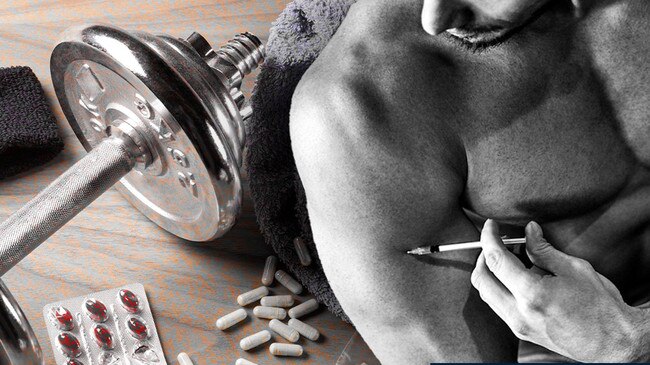Casualties from Australian sport’s war with dodgy supplements, steroids and PEDs are rising with some criminal gangs creating substances so dangerous they can kill. CODE Sports goes inside the black market to expose the levels unscrupulous manufacturers and sellers will stoop to and how they’re targeting our teens.
--------------------------------------------
The civilian casualties from Australian sport’s spat with dodgy supplements are mounting.
Every day, more and more elite and amateur athletes are conned by products that make grandiose promises to help them build the perfect body or deliver the perfect performance.
Some of these products are legal, but just as many are linked to criminal gangs. Some are harmless, while others are so dangerous, they can kill.
Working out which is which has become almost impossible because of the lax regulations in the global sports nutrition market and the levels unscrupulous black market manufacturers and sellers will stoop to.
As Dr Naomi Speers, the Chief Science Officer at Sport integrity Australia (SIA), put it: “supplements are a minefield.”
Working with regulators and criminal intelligence investigators, SIA is figuring out a variety of ways to combat the rise of supplement use - which includes everything from vitamins, minerals, herbs, protein shakes and bars to poisonous hardline drugs illegally imported from China and the United States.
THE TEMPTATION BEING FUELED BY SOCIAL MEDIA
A 2020 study, conducted by SIA researchers, found that around half of 240 boys at a Melbourne school, aged 14-16, were already hooked on protein powders while almost two-thirds said they planned to use them.
Around one in 12 said they were using the muscle building compound creatine while 4 per cent of the respondents admitted to using steroids - as much to impress girls with their hot bodies as their team mates.
One of the biggest concerns for sports experts is that the public mostly doesn’t have a clue what they are putting in their bodies, especially when they buy products off the shelf from reputable retailers.
Another alarming study found that one in five nutritional products sold in Australian supermarkets was contaminated with substances that are banned by the World Anti-Doping Agency.

In many cases, those prohibited substances are not even listed on the labelled ingredients, leaving high-performance athletes at risk of testing positive and being charged with a doping offence.
Anti-doping officials know all about the products but are reluctant to publicise the list for fear it will trigger a sales frenzy among young people looking for a quick fix.
“We know that unfortunately, some people out there will be looking for products that have banned ingredients in them because they want something that they think ‘works’”, said Alexis Cooper, SIA’s Director of Education.
“So they might go directly to a list of supplements that have banned ingredients and go ‘I’ll take that one and that one and that one.’
“So what we do instead is we have an obligation to tell athletes if we know a product has a banned ingredient in it…as opposed to having a free for all list which could be abused by people who want to take banned ingredients.”
THE VICIOUS CYCLE OF ADDICTION
But the gravest fear, according to all the experts, is how over-the-counter supplements can quickly become a gateway to more dangerous ‘wonder’ drugs that are not properly tested or policed.
These include Selective Androgen Receptor Modulators, better known as SARMS, that are often marketed as harmless supplements.
Dr Speers said there is growing evidence, coming directly from athletes who have tested positive to banned drugs, that illegal SARMS are being sold to Australian kids under the pretense that they have the same positive effects of steroids without the side effects.
“The reality is they’re not cleared through clinical trials so we don’t know what the long term side effects are, but there’s already evidence of harmful effects to heart and liver that people need to be warned about.
“Unfortunately, it is easily accessible through online websites,” she said.
“And what we suspect is that people start going to the supplement store to buy a protein powder then they think I need something else, they get a pre-workout powder, and then the next step is that the person in the shop says, ‘I’ve got this other product that you might want to try’.
“And it looks professional, it’s got a beautiful label, but they don’t tell you that it’s got substances in it that haven’t cleared clinical trials and they don’t tell you about the health effects of those products.’
Not knowing what is contained in SARMS - which currently account for around half the positive drug tests in Australia - is just the tip of the iceberg.

‘HARMLESS’ DRUGS THAT CAN KILL
The real threat is how unsafe some of the hidden ingredients are.
“So there’s two risks. One is that the substances that they say they’re selling to you are not cleared through clinical trials. So we don’t know what the long term health effects are. Their safety hasn’t been checked properly yet. They can’t be sold as a medicine because they haven’t passed the safety checks,” Dr Speers said.
“The second risk is that because they’re not legitimately manufactured, you don’t even know what’s in them. So there’s some studies out there that show that these products that claim to contain the SARM actually contain another substance called GW 1516, which is a known carcinogen.
“The actual clinical trials for GW1516 had to be stopped because it was so hazardous. So there’s the risks that we don’t know about and then there’s probably substances in there that you aren’t told about that we actually do know are even greater risk.”
FIGHTING BACK AGAINST A MULTI-BILLION DOLLAR EMPIRE
Though the battle rages on, SIA has had some significant wins in its long fight to stem supplement use.
In 2016-17, 17 Australian athletes tested positive to prohibited substances found in supplements.
Many did not intend to cheat but were caught out for using contaminated products. These included marathon runner Cassie Fien, whose sad case prompted SIA to implement a radical new approach to dealing with supplements after previously warning everyone not to take any supplements whatsoever.
Accepting that prohibition was impractical, SIA has instead redirected its energies to an enhanced education program to help athletes avoid accidental positive tests, while launching an app that instantly tells someone if a product contains banned substances.
The about turn has worked a treat. In 2021-22, not a single Australian athlete recorded a positive test from a supplement.
“We also do a bit of work with parents, so we have an online course and a booklet that we give out to sports and to parents directly, which has advice on if your child wants to buy a supplement,” Cooper said.
“We know that’s really important because there’s research that shows that 50 per cent of adolescent boys between the ages of 14 and 16 are using something.

“And then we also work with coaches. I can’t overstate how important coaches are. So there’s another piece of research which shows that 50 per cent of athletes aged 13-18 who use supplements have been given that direction, or that advice, from a coach. So making sure coaches know what information that they’re giving to the athletes is critical.”
SIA had another major breakthrough in 2020, when the Therapeutic Goods Administration (TGA) reclassified sports supplements as medicines, rather than as foods, which meant they were bound by stricter regulations around product labelling.
In 2011, the federal court ordered Evolution Supplements Australia to pay $11 million for unlawfully advertising a range of unapproved sports supplement products, including references to steroids, SARMs and amphetamine derivatives.
But it’s still a grey area where there’s more that needs to be done because it remains a David and Goliath battle with a lot of pushback.
The sheer scale of the business is staggering, with a recent American study valuing the sports nutrition sector at a staggering $76 billion, rising to $128 billion by 2030.
And the rules for retailers about what they sell in their stores remain lenient.
While SIA can’t tell supermarkets and chemists what supplements they should and should not stack on their shelves, Sharpe wants one of the big chains to take the lead and promote the SIA app encouraging consumers to check first before they buy anything.
“We still have a long way to go but it’s starting the conversation, realising the problem, accepting that it’s not just ‘don’t do it, it’s bad’. You’ve got to change the way you think,” Sharpe said.
“It’s our job now to go out to the people that are selling these problem products and work with them.”

DISPELLING THE MYTHS AROUND SUPPLEMENTS
Athletes whose careers have been derailed after they unknowingly ingesting prohibited substances have also spoken out about the dangers.
They all have powerful stories to tell because they copped hefty suspensions but Cooper said there was a simpler message everyone could take on board.
“The marketplace is not safe. And my job in education and everyone’s job is to protect athletes and they don’t stand a chance if 20% of the supplements contain banned ingredients that aren’t even on the label,” she said.
“I think the biggest misconception is that you need them.
“People think that when you’re an athlete, no matter what level you’re at, whether you’re at elite level, whether you’re state or recreational, they think that they need supplements whereas the research shows that in the very large majority of cases, supplements just give you expensive urine.”
Dr Speers said there was another big fallacy that needs to be kicked into touch.
“The second misconception is that things that are sold in Australia must be safe,” she said.
“I would have previously accepted that if I walk into a supermarket, if it’s sold there, I don’t even need to consider the risk. But people really do need to consider the risk to their health of using these products.”


Sam Konstas sent home from Sri Lanka
Rising Australian star Sam Konstas has left Sri Lanka early after he was left out of earning a place in the team for the second Test.
Sam Newman goes nuclear on ‘neo-Nazi’
Sam Newman has turned the flamethrower on a prominent ‘neo-Nazi’ in the wake of fierce backlash to an upcoming podcast episode.